Mikan Watch #107: Tokyo Mirage Sessions #FE
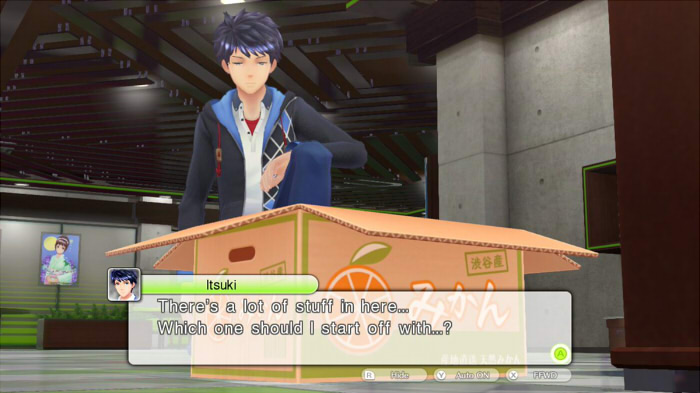
That’s Tokyo Mirage Sessions “Sharp” FE, as in the musical notation – I’m just too lazy to figure out how to type that.
Tokyo Mirage Sessions #FE is that game that Nintendo initially announced as Shin Megami Tensei X Fire Emblem (where “X” is “Cross”, in this case), the game theoretically mashing together Atlus’s flagship RPG branding with Intelligence Systems Fire Emblem series of strategy games. This, of course, set alight expectations of some dark, gritty psychologically fraught low-fantasy epic amongst those who claim Japanese RPGs are now “Too Anime” (which is pretty much just a catch-all for lazy criticism).
They should probably have known a little better.
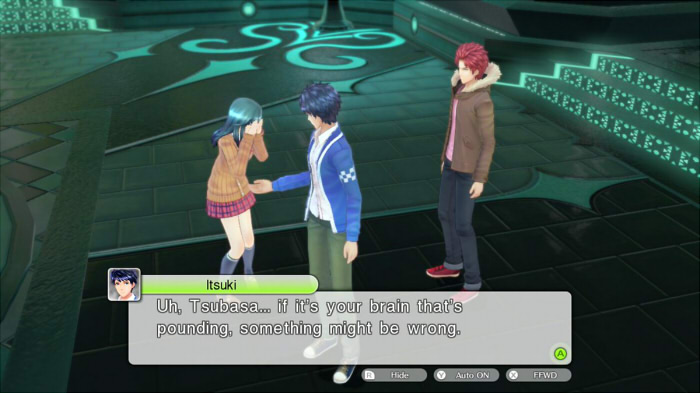
TMS#FE probably owes more to Persona than anything else in Atlus or Intelligent Systems back catalogues, even if some Persona fans continue to protest a little too strongly about that point. This isn’t to say that it’s a straight Persona clone or anything – it’s very much a more streamlined game than that – but there’s a lot of terms of structure and narrative that is familiar across the two. I mean, it’s about a group of mostly teens investigating mysterious disappearances involving a mysterious other-plane adjacent to our own dimension, where personal hang-ups have a habit of manifesting, whilst they battle demonic creatures supported by Stand-like beings.
Of course, the big difference is that, rather than being a group of teens hanging around a department store on an evening investigating a serial killer, you play as the members of a small talent agency based in Tokyo. Whilst not everyone involved is what you’ve consider an idol (though most of them do supply some kind of banging pop number during the course of the game), everyone is some kind of entertainer – idol, Tokusatsu star, cooking show host – whilst they’re investigating people who are being sapped of their ability to entertain as opposed to meeting their deaths in a grisly manner. Their Persona stand-ins, on the other hand, are roughly based around characters from Fire Emblem rather than heroes and demons of myth and legend.
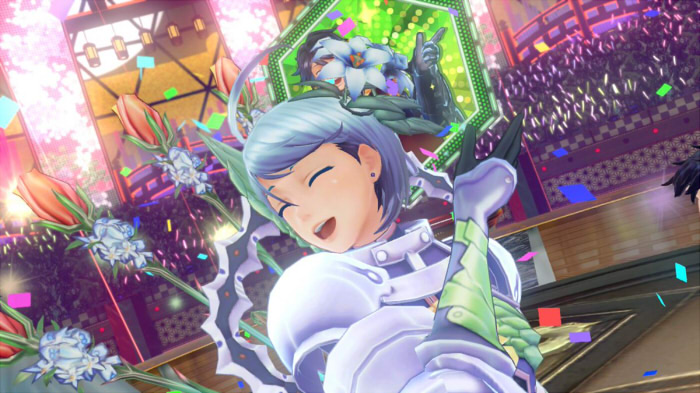
It is, however, a way less intimidating game than Persona can sometimes come across. That cuts both ways, obviously, in terms of the games quality. Things like the games strict adherence to the calender and short-term deadlines are gone, instead presenting you with a much more traditionally linear RPG rather than something where you have to worry about micro-managing your finances or charisma. It doesn’t have social links, but it does retain a series of character side-stories for every major character which play out in a pretty similar fashion. There’s no Persona fusion, as you are tied to specific Fire Emblem heroes, but you can fuse weapons to give your characters new skills, and you still have to make some real tough choices about what you choose to retain.
Unlike Persona, though, the dungeons are fixed rather than random. The random nature of Persona’s dungeons is partially a necessity of the fact that you are grinding those things a lot, and the game can’t really accurately predict how often you are going to visit within a given period of the game given it’s relatively open structure. Being a rather more linear affair, TMS#FE instead takes the opportunity to present a bunch of puzzle obstacles to hinder your progress. The second dungeon, for example, has your party manipulating the arms of a series of giant Maid uniforms, which the users crawl through in order to navigate a three-dimensional maze. There’s some kind of gimmick complicating pretty much every dungeon in the game.
Combat is an interesting kettle of fish. As with most SMT games, and the assorted spin-offs, it leans very heavily on discovering and exploiting physical and elemental weaknesses. A little of the Fire Emblem bleeds through here, in so much as, if what you are fighting has a visible trait that looks like it’d be weak to a certain type of weapon in Fire Emblem, it’s probably weak to it in this. Flying enemies are probably weak against bow users, whilst things that look like they have swords are probably weak against spears. Otherwise, it’s largely the usual SMT array of elements and magical attacks – it’s all your familiar Agi’s and Bufu’s you’ll be attacking your opponents with in an attempt to find the chink in their armour.
Rather than allowing the attacker a second attack upon exploiting it’s weakness, however, an attack against a weakness in TMS#FE results in the activation of something called a session, whereby characters with appropriate types of follow-on skills within their arsenals will automatically follow up with an attack of their own. As the same starts, this only occurs amongst characters within your active party, but as the game progresses, characters progressively get skills which allow the off-party members to also join in. When coupled with randomly-activating character duet skills you gain as you progress through character subquests, which have the effect of extending your session, you can end up with a single attack lasting a good couple of minutes at times. It’s simultaneously really satisfying to pull-off, and kind of hellishly time-consuming.
The game does allow you to switch characters out mid-battle. As with any of these SMT games, your characters are as susceptible to elemental attacks as your opponents, and it’s real easy to get annihilated from nowhere, so being able to swap in your healers, or characters string against opponents of certain elements, is both a relief and clutch to smoothly progressing through the game. This does mean that there is rather the expectation that you will need to use everyone in the course of the game, and will need to keep everyone levelled in step. The game does, thankfully, make this relatively easy.
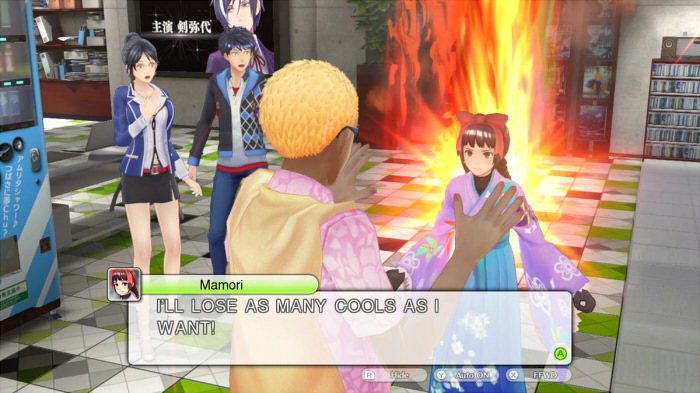
Honestly, though, the main attraction of TMS#FE is probably that the cast is full of staggeringly entertaining doofuses and nit-wits. The banter is amusing, and the characters are generally fun to be around. Even when some of the characters perhaps come across as being a little one-note at times – every third word out of Ellie’s mouth is “Hollywood!” right until the end – they at least do things with it. This isn’t to say that the games overriding tone isn’t one of immense camp – the games secondary cast, after all, includes a Vocaloid and a former American death-metal guitarist turned Magical Girl fanatic, and there’s a recurring subquest character who exclusively goes by the name of “Tiki is my Waifu” – but it’s an overwhelming comfortable campiness that made me laugh out loud with almost alarming frequency.

The game does given the cast ample opportunity to be dumb, too. At various points during the games narrative and it’s sub-quests, you are treated to what passes for televised entertainment in this world. Between this and Aikatsu, I do start to wonder what Japanese TV is actually really like – I’d presume it’s nowhere near as surreal as these things suggest, otherwise we are really missing out by only really getting their anime…
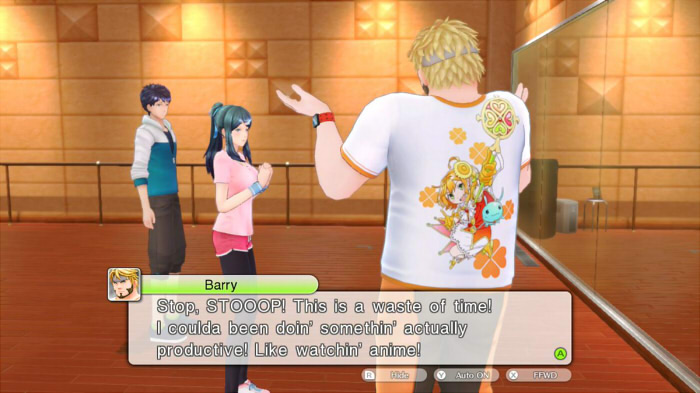
Also, this game is really kind of pretty. Whilst it’s not Atlus’s first HD game, it is their first internally developed HD RPG. It displays their usual flair for user interface, and just design ethic in general. It works in a palette that, whilst some would deride as being “too anime”, far too many games shy away from. Combat in particular is an insane barrage of colours, but never overwhelmingly so. The music in the game is pretty great too, particularly in the animated musical performances the game treats you to every few hours (and, hey, Fripside and Love Live’s Yoshino Nanjo puts in an appearance as one of the games main cast).
If it’s not too obvious, though, I kind of really enjoyed this game. Whilst Trails of Cold Steel II is out today in the US to threaten it, Tokyo Mirage Sessions #FE is probably my favourite game of the year thus far. I mean, there’s a bunch of things you could complain about – whilst most of the edits for the English language release Nintendo made don’t particularly bug me, some of the costume changes are really inexplicable given what is still in the game. It’s not exactly a deal breaker or anything given everything else the game has to offer, but it’s just plain weird at times. Your mileage may vary, of course.
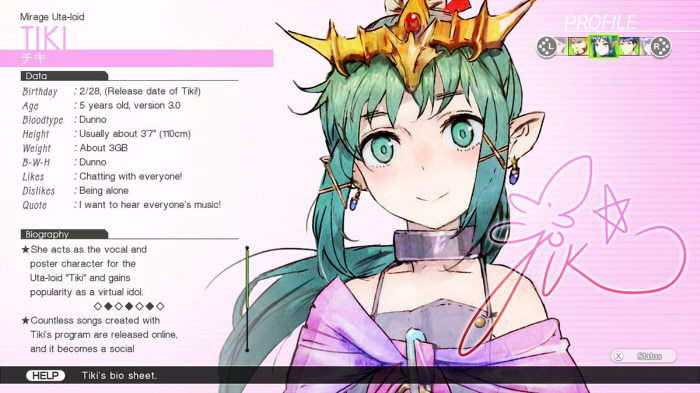
Also, “About 3GB” is still the actual best joke.
